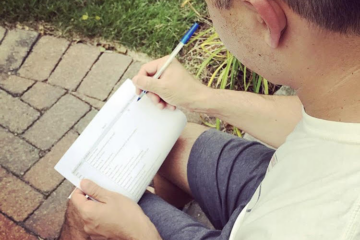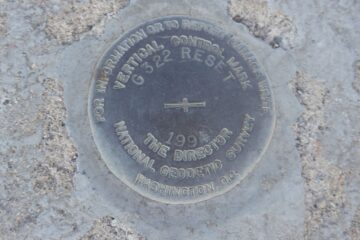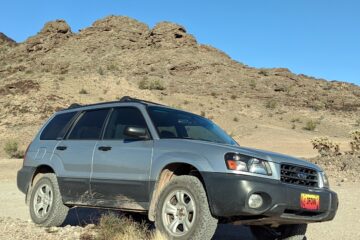This article was written and published on MightyGoods.com. Click here to visit their site and read more about how to successfully pack your bag for your next adventure: 4 GEOCACHERS SHARE HOW THEY PACK THEIR BACKS FOR GEOCACHING TRIPS.
Geocaching is modern treasure hunting using a GPS device – and to have an enjoyable experience, you need to pack properly before you start your geocaching trip.Don’t pack too much, but at the same time make sure you remember all the essentials!
To improve how we pack our bags, we have talked with 4 experienced geocachers and asked them to share their best advice.
Read on and learn from their best tips and tricks (all the geocachers have lots of experience, so they really know what they are talking about!).
The 4 Experts
 My family lives in Williston, North Dakota. Both my husband and I grew up in Williston, moving here in elementary school, leaving for college in Grand Forks, and returning after graduation to start our family. We started geocaching in college, while looking for something fun and different to do on the weekends.Six years later, geocaching has evolved into a major past-time of mine. I love how it takes us on adventures all over our state, mini tours when we travel, and connects us to an international community. My favorite geocaching destination would have to be Summit Trail in North Dakota. This was our first “real” hike as a family of three. We discovered gorgeous views of the badlands, looking over the river to Theodore Roosevelt National Park. I can’t wait to go on the next geo-inspired hike.
My family lives in Williston, North Dakota. Both my husband and I grew up in Williston, moving here in elementary school, leaving for college in Grand Forks, and returning after graduation to start our family. We started geocaching in college, while looking for something fun and different to do on the weekends.Six years later, geocaching has evolved into a major past-time of mine. I love how it takes us on adventures all over our state, mini tours when we travel, and connects us to an international community. My favorite geocaching destination would have to be Summit Trail in North Dakota. This was our first “real” hike as a family of three. We discovered gorgeous views of the badlands, looking over the river to Theodore Roosevelt National Park. I can’t wait to go on the next geo-inspired hike.

What top 3 things do you bring besides the common stuff all geocachers bring?
The top 3 things I bring in my bag, besides the more common answers, would be:
-
- A selfie stick and tripod with Bluetooth clicker
I enjoy taking pictures, using them to document and remember my finds (obvious if you check out my IG account @GeoJangie), but unless you have either of these two contraptions while you’re out hiking or geocaching solo, you might not get a very good picture of the whole location or yourself. They definitely improve my geocaching experience – and will help build a neat photo collage one day on one of our walls.
-
- A log roller
Most experienced cachers know and probably have one of these bad boys. It took me a while to discover this amazing little TOTT (tool of the trade). Seriously. It’s amazing. If you don’t have one, you should probably go buy one – or figure out how you can make your own. I recently held a micro log rolling competition at an event, and the cacher with the log roller won by a landslide. Swept the competition. It’s an essential.
- Hand warmers
These cheap little packets of warmth (I bought a pack for $.99) are necessary for winter caching. I was told about this trick this past year, while I was complaining that my phone (aka my GPS) kept dying in the cold temperatures. Get the little warmers working and hold them against your phone, then pop everything in your winter coat pocket while you’re caching. Boom – no longer shutting off randomly while caching.
The most useless thing I’ve been advised to carry would be a toothbrush. Now, don’t get me wrong, I get how you might find it helpful when cleaning grooves on lids – a few people have recommended it – but I forget I have a toothbrush with me AND the whole container is not typically the cleanest thing ever, so cleaning it seems a bit silly. It’s going to get all nasty again anyways.

How do you bring things with you?
We’ve tried out a few bags, but right now we are carrying a Mountain Warehouse Merlin 12 Litre Backpack. It’s a smaller day pack, giving us the perfect amount of room for all of the gear we bring on a usual day caching trip (this excludes the diaper bag we bring in the car for our daughter). We re-configure and plan what we need so it all fits in this small backpack. The front zipper holds our pens/pencils. The second compartment holds the less-needed things, like our mini geocoin holder (a business card holder) and a mini first aid kit. The third (and largest) part holds everything else we bring, separated into baggies and a zippered small makeup bag. The makeup bag holds my pathtags, personal caching cards, and travel bugs we’re moving. One baggie holds TOTTs and the other holds swag. This compartment has a water bottle pouch, which holds our selfie stick, tripod, clicker, magnet stick, and flashlight. The last, slimmest zippered compartment is used for brochures I’ve created about geocaching, just in case we run into a muggle. I’ve also used this compartment to store my book (Sophia Finds a Geocache) if I’m going to an event and anyone asks to buy an autographed copy. The size of this backpack is perfect for my family right now.
What are your top tips for other geocachers?
In preparation of each geocaching outing, I read the descriptions and plan for the terrain/difficulty. If possible, I try to remove items from my bag and add water or snacks instead (for hikes). I like to use that makeup bag (I think it was a gift) as a mini bag, which I prep for quick PNGs, storing all the necessary tools for a quick sign, roll, and replace.
My main tip when packing for geocaching is to not go overboard. Don’t pack things you won’t use (perhaps this will take some time to figure out), and make sure the things you use most often are easily accessible. Bring extra pens! Your backpack can set you up to find or DNF – so always be as prepared as possible – so double-check those descriptions and D/T ratings. Maybe you’ll need a ladder or a weird screwdriver – pop that in the bag. No matter what – get outside – geocaches aren’t the only things to be found.
Gary Slinkard have been avid geocacher for over 10 years. He and his wife, Susan, have found over 1,300 geocaches and have hid and maintain many near their home in Northeast Texas. Gary has a weekly podcast, Geocache Talk, where he interviews geocachers from all over the world. He’s written two books, Hide and Seek: Life Lessons of a Geocacher and 201 Geocaches To Find Before You Die.One day I bought a GPSr. So here I was noticing where a creek was had become my one and only trick and, as Susan said, I needed to come up with an-other reason why I spent money on this gadget. So, I started searching the Internet for more information and ran across geocaching. Now, this was back when there were no smart phones or at least I didn’t have one and we were just learning how this device even worked.
We would print out a handful of geocaches for the day’s hunt and hoped that we could find one or two. Susan would carefully mark each page whether we found it or didn’t and that night I would log them in on the geocaching.com website. We are still not the fastest geocachers out there that but we have had a few days where we have found 24 geocaches in 24 hours. This is probably just a morning hunt for some but we tend to not move that fast.
Our favorite place to go is our wonderful State and Local parks. You can enjoy a great hike and find geocaches and that is an unbeatable combination.

What top 3 things do you bring besides the common stuff all geocachers bring?
My trusty Nano Log roller is always with me on my keychain. Susan has the PowerTank pen, which never fails to write on a log no matter its condition. I also carry in my geobag a magnet on a retractable wand and it has gotten many a cache out of a tight spot or a lid that I’ve dropped which I do quite often.
How do you bring things with you?
My regular geobag is a very large Targus 17″ laptop bag full of tools, blank logs, replacement containers, and some bottles of water, snacks, etc.
I try to keep all the logs and containers in one part of the bag and all the tools in another with the water and snacks on the outside pockets.
I carry too much but I always fear not having the right item with me so I lug the behemoth around anyway.

What are your top tips for other geocachers?
So, you have decided to try geocaching? Awesome! As you go out looking for your first geocache, you run into a problem. You can’t find it! So now what? What you do next will ultimately determine whether you stick with the sport or not. Many people quit too early and that’s a shame. Until you have some experience geocaching, finding the first few will not be easy.
One of the benefits to geocaching, is the benefit of exercising a muscle that many times gets overlooked. Now, I’m not talking about your biceps or triceps but that muscle that I’m referring to is your brain doing problem-solving. The good thing about exercising this particular muscle is that it can help you in normal day-to-day life as well.
In my opinion, one of the ways to really enjoy geocaching is to combine it with other sports and hobbies that you might have. I’m not saying that you have to do this but I think in the long run it is a way to enhance both of your interests or perhaps even more than two. Some examples would be hiking and geocaching, rock-climbing and geocaching, scuba diving and geocaching, or one of our favorite combinations is sightseeing and geocaching.
Visit Gary Slinkard’s website
 I’m from Cambridgeshire in the UK, it’s a very flat part of the world so I love to travel in search of adventures.I’ve been Geocaching for four years now and have found over 2000 caches. I started Geocaching as a way of entertaining my children during the school holiday, but quickly began to love how it helped me to discover new and amazing places. These days I prefer to find more adventurous caches, such as those underground, in caves, tunnels or at the tops of mountains. I enjoy the challenge, sense of adventure and scaring myself silly.
I’m from Cambridgeshire in the UK, it’s a very flat part of the world so I love to travel in search of adventures.I’ve been Geocaching for four years now and have found over 2000 caches. I started Geocaching as a way of entertaining my children during the school holiday, but quickly began to love how it helped me to discover new and amazing places. These days I prefer to find more adventurous caches, such as those underground, in caves, tunnels or at the tops of mountains. I enjoy the challenge, sense of adventure and scaring myself silly.
What top 3 things do you bring besides the common stuff all geocachers bring?
I really do prefer to travel light when geocaching and will stick to the bare essentials, a pen, my power bank and drinks/snacks to keep the children motivated.
I’m not a fan of searching in places that might be home to spiders *shudder* so tend to use my phone camera in selfie mode to help me see in such spaces. You’re welcome.
I’ve seen people using telescopic magnetic pick-up tools for caching but I personally enjoy the challenge without.

How do you bring things with you?
I always have things stuffed in my pockets, but my current go-to bag is a Fjallraven Kanken Mini, as it’s light and I can carry my basic essentials easily.
If I need to carry more provisions, for a longer day out with the kids I love my Osprey Comet Backpack, which has plenty of room for all we need.
For longer walks into the mountains, or over a long distance I will always use my Lowe Alpine Airzone Rucksack, it does mean I carry a little more weight but it’s worth it to avoid a sweaty back. The rain cover and hydration sleeve are also invaluable. The only thing I would improve would be to add hip belt pockets for easier access to snacks and fuel on the go.

What are your top tips for other geocachers?
My top tip for other geocachers would be to pack a pen, a spare pen and one more for good luck. I’m terrible and always losing my pens, my eyeliner has recently been called to action in a cache signing emergency.
Other than that, don’t worry too much about special equipment, access to a map on your phone or a paper map would aways be advisable in an unfamiliar area, but otherwise just make sure your phone battery is full and head off for your own geocaching adventure.
Visit Clare Williams’ website
 I am from the coastal town of Bray, just south of Dublin in Ireland. I moved to Belfast in Northern Ireland just over two years ago. I started geocaching almost five years ago, after accompanying my brother in law, nephews and niece on a geocache hunt in Bray.I don’t have one favourite geocaching destination – anywhere with a nice view is a great geocaching destination in my book!
I am from the coastal town of Bray, just south of Dublin in Ireland. I moved to Belfast in Northern Ireland just over two years ago. I started geocaching almost five years ago, after accompanying my brother in law, nephews and niece on a geocache hunt in Bray.I don’t have one favourite geocaching destination – anywhere with a nice view is a great geocaching destination in my book!
What top 3 things do you bring besides the common stuff all geocachers bring?
- Foot stool
- Litter picker
- Hi-vis jacket
The foot stool comes with me on road trips. I am 5 foot 4, which is not exceptionally short but it can make some caches slightly out of reach. I have been known to shamelessly extract this neon kids’ footstool from my car in the middle of a crowded park when an FTF is up for grabs!
A litter pick is another great height extender for those caches too high up for me. I often also use it for its intended purposes of picking up litter when I’m out on the trails.
A hi-vis jacket is something of an oxymoron: you would think it would make you stand out more to muggles but it tends to have the opposite effect. If you look more ‘official’, muggles are less likely to wonder what you’re doing fingertip-searching an entire railings.

How do you bring things with you?
Ideally, I will carry as small a backpack as possible but the size will change depending on the type of hike I’m undertaking. I have two different size backpacks from Mountain Warehouse. When you’re walking uphill, the least amount of weight on your back is the best amount so I try not to overload with unnecessary stuff. Water and sustenance is a must and then I try to bring only small tools to minimize weight.
What are your top tips for other geocachers?
Packing light is not a bad thing but being under prepared for a day on the trails is far worse. A first aid kit is a must if you’re undertaking a tough hike, as well as spare batteries for your GPSr and a power pack for your phone.
If you’re just starting to get outside, work up to the longer hikes and you will learn as you go what you cannot do without when you’re out on the hills and trails.

Visit Sarah McLarkey’s website
The Geocache Talk blog wants your geocaching-related stories and insights – and packing tips! Please contact me, Angie (aka @GeoJangie), to write a guest blog post or if you have any recommendations for subjects or authors. I can be reached via my email: JangieGoWest@gmail.com or through Instagram, Twitter, or Facebook.
Enter your email address below to receive each new Geocache Talk blog post directly into your inbox!




